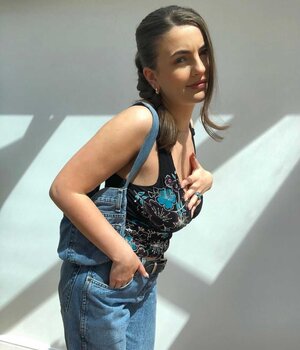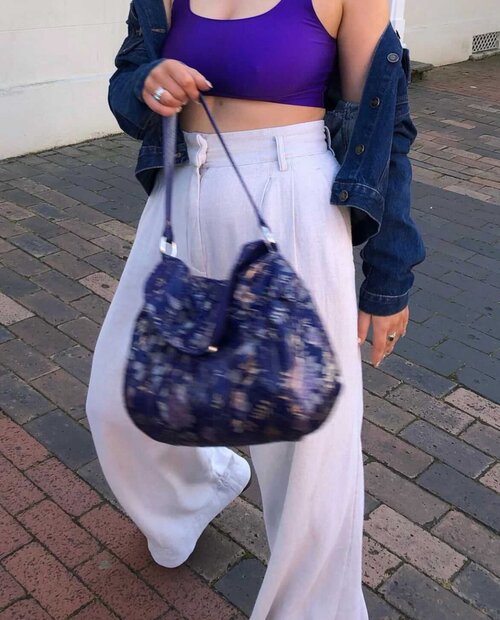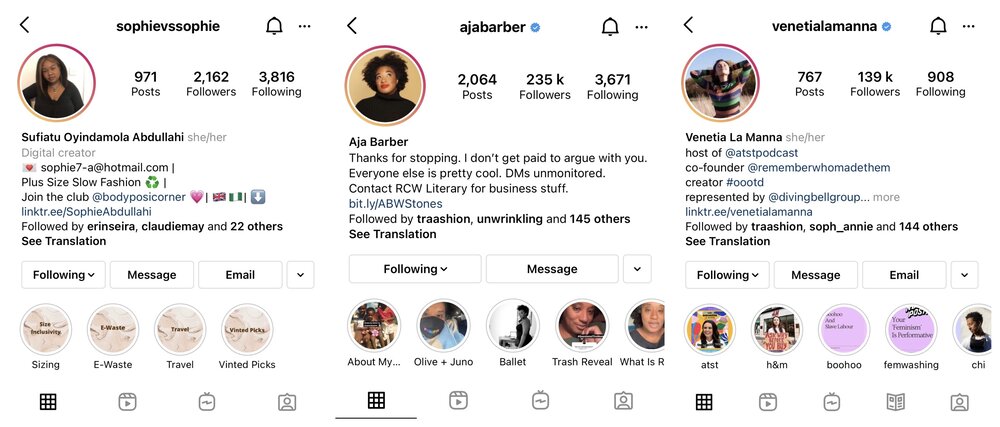Jun 24
Slowing Down with Becky Mary Hughes
Over the past year or so, (thankfully) there has been a significant increase in the amount of light shed on the reality of fast fashion. People are becoming more and more aware of its damaging effects, and starting to opt for more sustainable alternatives - be it sustainable brands, or second-hand shopping. Meanwhile, the surge of ‘fashion influencers’ has also seen the rise of the ‘sustainable fashion influencer’, who advocates for mindful consumption and making ethical choices.
Last week I had the opportunity to chat to Becky Hughes (@beckymaryhughes) about her personal break up with fast fashion, and how it impacted her life beyond just the clothes which were living in her wardrobe.

When did you start being more interested in sustainability, and more specifically sustainable fashion?
“When I was growing up I was always interested in charity shops. My mum and sister are both thrifty people, so I guess I kind of had a passion for it growing up. I ended up volunteering at a charity shop and loving it, and I really fell in love with the process of having to look for stuff and finding a gem, which felt so much more rewarding to me. But it wasn’t really until the start of 2019, when I made a new years resolution that I wasn’t going to buy any more fast fashion. I wanted to focus more on second-hand than slow fashion, and start taking my time when I felt like I would want to buy something, thus becoming more conscious of my habits as a whole.”
Was there anything in particular which you can remember inspiring or triggering you to notice the difference between slow and fast fashion and start your ‘journey’?
“At the end of 2018, I did a massive fast fashion shop with a brand I’d rather not name. A lot of the items I received were either broken or stained, and it really made me think “who made my clothes?” Don’t get me wrong, it wasn’t at all about the clothes being made incorrectly, but it made me consider the entire ship and returns process. Around the same time, I found out about the Rana Plaza incident, which had obviously happened years earlier. I know it sounds horrible, but I guess I just didn’t necessarily ‘care’ where my clothes came from, and now found myself in a position of really wanting to do something and change my behaviour. If I’m being completely honest, I really didn’t expect that I would actually manage to do it.”
What was the first thing you changed about your previous habits?
“I went on my phone and unsubscribed to any fast fashion email newsletters I was previously receiving in my inbox. I also unfollowed the brands on Instagram and Twitter, and unfollowed a lot of influencers too. It wasn’t anything malicious at all, when I see them in the feed I really do think they look amazing, but that just ignites a feeling of wanting to buy more than anything else, and I wanted to eliminate any sort of temptation altogether.
“I honestly felt a bit of a rebirth. I was able to look at my own wardrobe in a brand new light. I was able to distinguish between which items I actually like and which ones I had bought for a single night out or a special occasion.”
How did these changes affect you and your life?
“I didn’t really begin to change my mindset properly until 2020. 2019 was still filled with a sort of ‘consumption void’ for me, and I really started to recognise that buying was actually very much like an addiction to me; an addiction to buying and hauling clothes. So by that point, I was still trying to fill that consumption void with second hand shopping.
At one point, I just realised that having so many clothes was making me extremely unhappy. In 2020, I finally did a purge of a lot of my items. I looked at what was uncomfortable, what didn't fit me properly, even things that I actually just didn’t like very much.
With second-hand shopping, you feel a different kind of persuasion. You find an item, and you almost don’t really consider whether or not you like it, it’s rather a fear of losing it if you’re not the one to get it. I started asking myself am I actually going to wear this or do I want it just because it’s vintage or rare?
I really started to learn how to let things go. I completely stopped going to shopping centres, which I used to do at least once every couple of weeks. I honestly can’t even remember the last time I went to one. It really does feel very freeing. I started realising what I could do with the time I wasn’t spending walking around a shopping centre; whether it was reading or making sure my room is tidy, which helps my mental health. The entire thing just gave me a lot of extra time and a lot of clarity.
Fast fashion is easy. Second-hand shopping is harder. But actually, when you decide you’re not going to buy anything, you start looking at your own wardrobe, which is even easier. It takes less time, it’s easy, I can use the Whering app (haha).
Buying into fast fashion is often seen as ‘retail therapy’ and self-care and it’s really not that at all. I remember when I was younger, I had just bought this top from TopShop which I was saving up for for a while. As soon as I walked out of the store, I was already panicking about what else I needed to buy to wear with it, which made me realise how temporary the feeling of novelty is when purchasing clothes. It really isn’t until you come to appreciate your own wardrobe (what’s in there, how to style it) that you can feel more permanent contemptment.”

What was the hardest thing about making the transition?
“It was definitely restraining the urge to buy too much and ending up with too much. I used to have to push down on my clothes in order to fit everything in my cupboard. When you think about it, our entire lives, to some extent, revolve around consumption. We’re always told to buy. Even when we’re out with our friends. For example, say you’re out shopping with them and you try something on and ask them “do you think I should get this?” and the answer is always “yes! Definitely,” even if it’s obviously something which doesn’t fit or suit me. I’ve realised that it’s so ingrained in our psyche to pressure ourselves and those around us to buy, buy, buy. So as soon as I was able to get past that, I just didn’t have this pressure to buy, and I also didn’t feel the need to pressure others to do that. I started changing my habits even with friends.”
What do you think are the greatest misconceptions about supporting sustainable fashion over fast fashion?
“I think often people think that you’re losing something, you feel like you’ll lose something if you make the decision to let go of fast fashion. But the reality is, you actually gain so much. And I mean even mentally and spiritually; having less stuff helps me prioritise my day and see everything with so much more clarity. I learned so much about slow fashion designers this year, and I was never someone who followed designers. I’ve definitely developed a much greater appreciation for what fashion actually is - the creativity, the excitement - and learned so much about new fresh ideas and perspectives on what fashion will look like in the future, what it is at all, and where my clothes are coming from.”
What is one piece of advice you would give someone who’s on the brink of making a change?
“I would definitely say to take your time. You don’t have to go cold turkey and do exactly what I did. Take the time to look at what’s missing from your wardrobe, and I don’t mean what you think is missing, but rather what is actually missing that will help you put together more outfits. For example, I recently bought a pair of Vejas (which were quite expensive, not gonna lie), because I realised my wardrobe was missing a pair of white trainers which are wearable; you can dress them up but also use them for something like popping out to the shop. Think of items which are very wearable and versatile.”
And finally, who are some people who have continuously inspired you along the way?
“Ahh this is so difficult, there’s simultaneously too many people I could say, but also now that I’m on the spot I feel like my brain is blanking entirely. Definitely Sophie (@sophievssophie), I love her fashion sense so much. I feel like when you like someone’s fashion sense so much, from just knowing them online, you almost connect with them more. Then of course, Aja Barber, I love that she’s always got a different perspective on something, and makes me challenge and revisit my own thoughts and thought process. And finally, though I could definitely list at least 100 more people, I love Venetia La Manna and the way she looks at wearing your old clothes, as well as her hashtag (#oootd - old outfit of the day), because it’s such a nice reminder that you can put an outfit together with your old clothes.”
